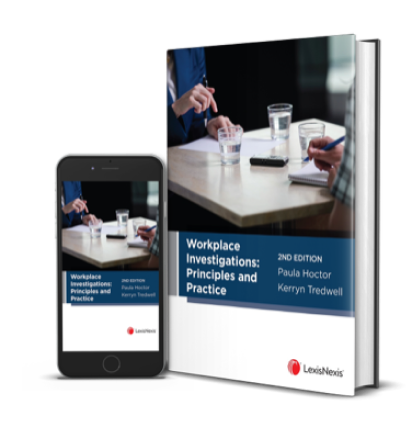WORKPLACE INVESTIGATIONS TRAINING
Internal Workplace Investigations: The Fundamentals
Learn how to conduct an impartial, procedurally fair and legally defensible workplace investigation from our experienced team of legally trained workplace investigators.
- Designed and taught by experts in the field
- Interactive and practical training
- Access to best practice investigation templates
We facilitate live workplace investigation workshops on set dates throughout the year.

How To Conduct An Effective Workplace Investigation
Workshop details and booking
By the end of this 1 day workshop, you’ll know how to conduct a workplace investigation that is fair and legally sound.
$995+GST
* Can’t see a workshop date that suits? Contact us to register your interest in an alternative time or location.

PUBLIC WORKSHOP
Internal Workplace Investigations: The Fundamentals
$995+GST
This fundamentals workshop aims to equip you with the knowledge and skills necessary to conduct procedurally fair and effective workplace investigations. Whether you are in a dedicated investigative team, Human Resources, Employee Relations, management or lead position, this training will provide you with valuable insights, best practices, and practical strategies to navigate the challenges of workplace investigations with confidence and integrity.
BOOK NOW
Select your preferred delivery mode and date:
Q Workplace Training has the industry expertise to support the professional development of internal investigative processes and teams. This workshop will provide investigators with valuable insights, best practices, and practical strategies to navigate the challenges of workplace investigations with confidence and integrity.
At the conclusion of our workshop, participants will:
- Understand the fundamentals of procedurally fair and people-centred investigations.
- Know the key stages of an investigation.
- Apply the key stages through a case study.
- Understand how to manage common difficulties that may arise during the course of an investigation.
- Know how to make findings and finalise an investigation.
You’ll receive 12 months access to our Investigations Toolkit of easy to use investigations templates to use within your team. Our templates are regularly updated and new ones added, to keep in line with best practice and legal principles. All templates are designed by Q Workplace Solutions, authors of the leading text: Workplace Investigations: Principles and Practice.
Agenda
Day 1 | 9.00am to 12.00pm
Day 2 | 9.00am to 12.00pm
Day 1 | Understand the process and plan the investigation
Overview of the regulatory framework
- An overview of the practical implications of key legislation.
- Overview of trauma-informed and culturally aware practices and why, from a regulatory point, they are expected approaches.
Stage 1 | Triage
- Factors influencing whether an investigation should be undertaken.
- What other alternatives can be considered?
- How to determine what type of misconduct may have occurred.
- Know when to investigate.
Stage 2 | Planning and scoping
- Ascertaining the purpose and scope of the investigation.
- What factors to consider in an internal investigation plan.
- Identifying an investigator – dealing with conflicts of interest and bias.
- Setting expectations of stakeholders.
Stage 3 | Gathering evidence
- Evidence gathering prior to interviews.
- Deciding who to interview and in what order.
- When to notify participants in an investigation.
- Investigative interview techniques and style – balancing sensitivity with the need to ensure a robust investigation.
- Guided examples on navigating difficult conversations and using trauma-informed approaches in interviews.
Managing difficult issues in investigations
- Requests for anonymity.
- Participants wanting to know the identity of others involved in the investigation.
- Managing difficult representatives.
- Maintaining independence.
Day 2 | Obtaining a response, making findings and finalising the investigation
Stage 4 | Allegations and obtaining a respone
- Overview on drafting allegations.
- Providing the Respondent with the allegations.
- How much information should be given to the Respondent?
- Balancing procedural fairness with challenges to confidentiality.
Stage 5 | Making findings
- Evaluating the evidence.
- Assessing credibility.
- How to weigh evidence and whether there is sufficient evidence to meet the standard of proof.
- Making well-reasoned findings of fact.
- What should and shouldn’t a report contain?
- Delivering the outcome.
Stage 6 | Closing out the investigation
- Preparing what to say to participants, and how to deliver the outcome.
- Continuing support for participants.
- Assessing any ongoing risks of retaliation or victimisation.
Q&A session

“Very practical, hands-on workshop led by industry experts. Loads of examples and case studies brought the process to life.”
HR Manager, Brisbane workshop
“Thank you for a practical course, targeting investigation skill development. Delivered by capable, experienced trainers skilled in facilitation.”
HR Manager, Melbourne workshop
“Very informative training delivered by experts. Great examples used throughout the day, highly recommended due to the excellent content and the expertise of the facilitators.”
P&C Business Partner, Sydney workshop
“The day was well paced in taking us through an investigation process from start to finish. I would highly recommend this masterclass.”
Group Human Resources Manager, Perth workshop
“Answered all my questions and gave a comprehensive explanation of the process. I liked the humanist approach to investigations.”
Senior HR Advisor, Brisbane workshop
“Content was relevant and practical. Presenters were very knowledgeable yet relatable.”
Principal Consultant, Sydney workshop
“The presenters were fantastic. I am new to this role and it made me feel I was on the right track.”
Human Resources Advisor, Adelaide workshop
“Interactive, interesting. Exercises based on real incidents.”
People & Culture Advisor, Perth workshop
“Subject was relevant to me. Speakers were knowledgeable. Appreciated the templates provided in the workbook. Informative and interactive. Great supporting document and helpful interactions with the teachers.”
HR Manager, Adelaide workshop
“Content was very relevant and practical. Presenters were very knowledgeable yet relatable. Very informative with useful, practical tips. The day was well paced in taking us through an investigation process from start to finish.”
P&C Advisor, Brisbane workshop
“Excellent content and presentation. Interactive, interesting. Exercises based on real incidents.”
GM Human Resources, Melbourne workshop
“Very informative and great tips. Experienced investigator and stories shared.”
HR Advisor, Perth workshop
“The course covered all areas of investigations, practical tips, examples, cases. Trainers were extremely knowledgeable, gave great examples and were happy to hear of everyone’s ideas. Excellent presentation.”
HR Manager, Melbourne workshop
“Enjoyed the Masterclass delivery and content, feeling better equipped to handle an investigation more thoughtfully. Your tools & tips will go a long way to helping me prepare when a situation next arises.”
Deputy Director HR, Brisbane workshop
Workplace Investigations: Principles and Practice
Own the essential guide for HR professionals, employment lawyers and workplace investigators. Edited by Paula Hoctor and Kerryn Treadwell.
